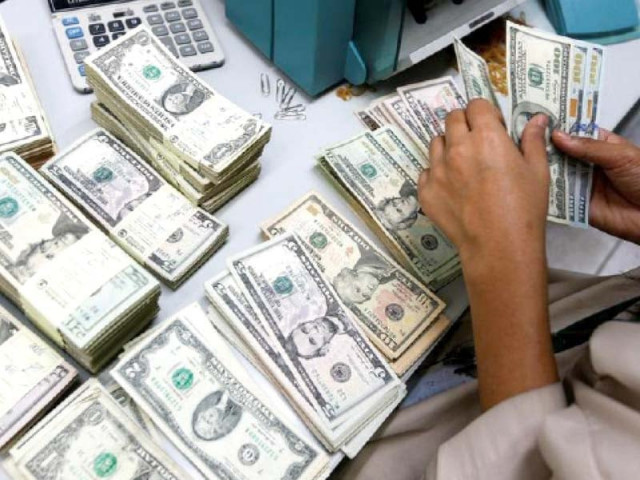Govt may amend law to bring in dollars
ITO amendment likely to raise cap on legally transferrable amount bypassing current unexplained income limits

The government is considering allowing people to bring in up to $100,000 from abroad without disclosing the source of income in a move that it hopes can fetch billions of dollars in the next fiscal year. However, this move can create some troubles.
Sources told The Express Tribune that the government is considering bringing an amendment to Section 111 (4) of the Income Tax Ordinance that deals with unexplained income.
Some describe the proposals as a perpetual tax amnesty scheme while others see it as an alternate source to arrange precarious foreign currency to avoid a default.
According to the current law, the Federal Board of Revenue (FBR) cannot ask the source of income, if foreign exchange remitted from outside Pakistan through normal banking channels does not exceed Rs5 million in a tax year; is encashed into rupees by a scheduled bank and a certificate from such bank is produced to that effect.
A few years ago, the then government had reduced the limit from Rs10 million to Rs5 million to reduce the chances of converting black money into white money.
In the last budget, the government had also expanded the web to the remittance received through money service bureaus, exchange companies or money transfer operators.
The sources said there is a proposal to replace “Rs5 million” with “$100,000” in the relevant section.
At the current rupee-dollar parity, Rs5 million are equal to $17,500 while $100,000 are equal to Rs29 million. This amount cannot fall in the category of normal remittance by a member to his family.
In case Prime Minister Shehbaz Sharif endorses the proposal, there will be an almost five times increase in the amount that the people can bring in without disclosing the source of income.
The government officials remained tight-lipped on the question whether there was a proposal to bring an amendment to Section 111 (4) but said that the dollar value has not yet been decided.
The sources said the Finance Ministry had also taken the central bank into confidence but the final decision has not yet been made.
Pakistan has committed with the International Monetary Fund (IMF) that it will not give any further tax amnesty. Any such move to relax the Rs5 million foreign remittances without disclosing the source of income will be treated as an amnesty.
Usually, every commercial bank inquires about the source of remittance of as small an amount as $500 before transferring an equal amount in rupees in the bank account of the beneficiary.
The sources said the government is hoping to receive billions of dollars through this channel which, they said, would provide respite until a new IMF programme is signed.
Pakistan has not yet been able to revive the IMF deal and the Fund has raised many questions about the budget figures shared by Pakistan. The IMF has also raised questions about the viability of the revenue estimates for the next fiscal year.
Signing a new IMF deal will be an uphill task particularly when the current $6.5 billion expires on June 30 without being revived.
The IMF staff also held discussions with the FBR officials on Wednesday to gauge the health of the proposed revenue measures and the FBR’s ability to collect Rs9.2 trillion in taxes in the next fiscal year.
There are chances that the international financial institutions may ask Pakistan to go for debt restructuring to qualify for the new bailout package.
The Reform and the Revenue Mobilization Commission (RRMC) had also recommended amending Section 111 of the Income Tax Ordinance to tax all undocumented Benami assets in the year of discovery.
But the commission’s proposal was to make the law stringent instead of relaxing it to the benefit of those who do not declare their hidden assets to evade taxes.
The purpose of the RRMC amendment was to address the issue of time-barred cases, as the FBR cannot tax old cases beyond a certain period. Section 111 deals with unexplained income and assets, which have been abused over the years by the people.
The Lahore Chamber of Commerce and Industry had also demanded the tax amnesty on the foreign exchange held by the citizens but not disclosed to the tax authorities. The finance minister had said during one of such meetings that the amnesty was not possible under the IMF programme.
The sources said the government is also considering further relaxing the tax regime for the traders, including easing some of the requirements for treating a retailer as a Tier-I retailer.



















COMMENTS
Comments are moderated and generally will be posted if they are on-topic and not abusive.
For more information, please see our Comments FAQ